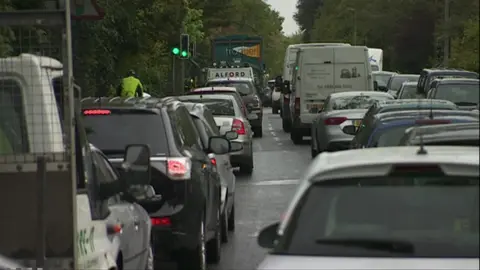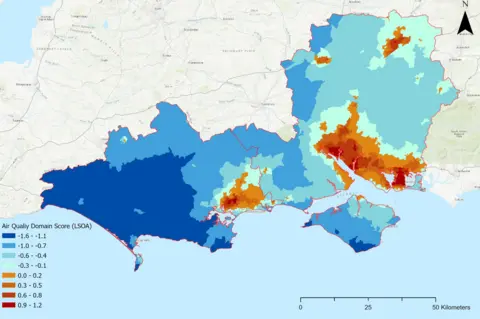Air pollution health fears for port cities
 BBC
BBCAir pollution is leading to long-term health problems in Dorset, Hampshire, and the Isle of Wight, and is putting a strain on local health services, according to a new report.
Researchers from the Clean Air South network say poor air quality is also contributing to deprivation and hampering productivity.
The port cities of Southampton and Portsmouth are more polluted than other areas, they said.
Co-author John Boswell said: "Those who contribute least to the problem are also the most exposed to it and the most vulnerable to its damaging effects."
The report was compiled by the University of Southampton's Sustainability and Resilience Institute, Wessex Health Partners, and the Centre for the South.
'Busy roads'
Where national air quality objectives are not likely to be achieved, local authorities must declare Air Quality Management Areas (AQMAs).
There are 15 of these between Southampton and Portsmouth, making up about half of those in the region.
Portsmouth City Council has estimated that 6.2% of deaths in the city in 2022 were attributable to long-term exposure to particulate air pollution.
Research also suggests cutting air pollution by one fifth in Southampton could result in 150 fewer children with low lung function each year.
About 29,000 to 43,000 deaths in the UK for adults aged 30 and over per year are a result of long-term exposure to air pollution, according to the Department for Environment Food and Rural Affairs.
But there has been some progress, with Hampshire County Council revoking 14, and Fareham Borough Council revoking both its AQMAs.
 CDRC
CDRCMr Boswell, who is also professor of politics and international relations at Southampton University, said: "Socially and economically disadvantaged groups are more likely to live near busy roads, have less access to green space, and live in densely populated areas, and are more likely to live in housing with inadequate ventilation and poor indoor air quality.
"But they are also the least likely to own a car or to travel as far for work, education and leisure.
"Young families and children also tend to live in areas with the highest concentrations of nitrogen dioxide.
"Children, whose lungs and other organs are still developing, risk breathing issues like asthma and developmental problems."
Adam Meylan-Stevenson, a postgraduate researcher at the university, and co-author, said: "We know local governments have a limited range of powers to improve air quality, but they are not powerless.
"They do have policy levers to manage traffic, control domestic burning, and provide public health information."
He said educating health professionals about the adverse effects of poor air quality could result in "fundamental changes".
The report does cite "successful work" between the Environment Agency, New Forest District Council and Fawley Oil Refinery to improve air quality.
Prof William Rosenberg, chair of Wessex Health Partners, said the "levers to drive meaningful change" lay within the private sector.
"Evidence shows that productive collaboration among stakeholders is a key cornerstone for port cities like Southampton and Portsmouth," he said.
But he said national and local governments also had an important role to play "in driving standards, monitoring effectiveness and ensuring accountability".
You can follow BBC Hampshire & Isle of Wight on Facebook, X (Twitter), or Instagram.
